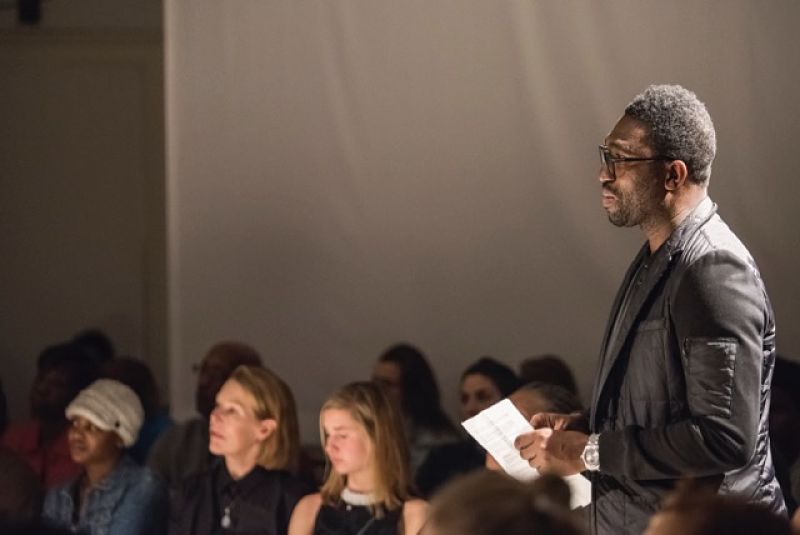It’s less than two hours before the premiere of his buzzed-about new play, but Kwame Kwei-Armah doesn’t have time to be a jittery writer. The 46-year-old Englishman—whose drama Beneatha’s Place will debut on this May evening—needs to stay true to another of his callings. Nattily dressed in a slate-blue three-piece suit, and radiating his trademark charm, he is focused on the playwrights’ panel that he is hosting at Baltimore’s Center Stage (formerly CENTERSTAGE), where he has been artistic director since 2011.
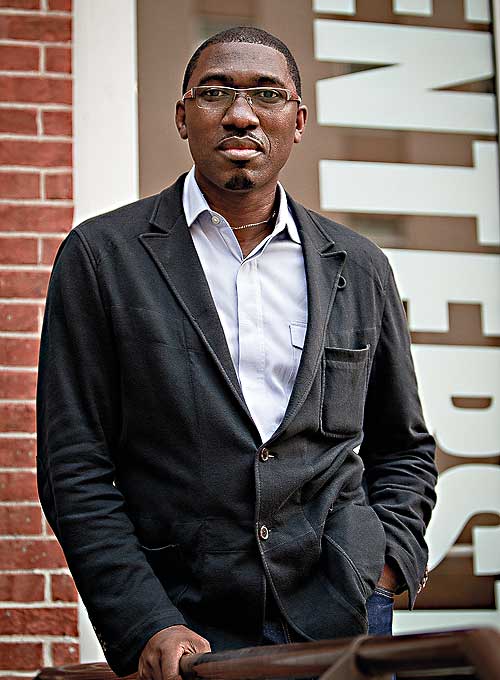
Sitting with dramatists Keith Josef Adkins, Lydia R. Diamond and Kirsten Greenidge, Kwei-Armah launches a conversation about “expanding the world of the black playwright—if it needs any expanding.” He listens to the writers as they riff on this topic, and he shares a few of his own sentiments, too. At one point, he observes that he views himself as one of the “sons of August”—and he knows that an August Wilson inheritance presents its own challenges.
“How do we stand on the shoulders of our giants and still find our own identity?” Kwei-Armah wonders aloud. “Does it have to be an either/or?”
For Kwei-Armah himself, the answer would seem to be no: He exemplifies the principle of both/and. This scribbler, director, actor, theatre leader and sometime recording and broadcast artist is a razor-sharp intellect, yet he wows people with his warmth. (He’s known for hugging everybody, even relative strangers.) He’s an acclaimed writer who holds the elite-sounding title of Officer of the Most Excellent Order of the British Empire—and yet, at Center Stage, he has striven to make inclusiveness the prevailing vibe. He’s a global citizen, who recently headed the World Festival of Black Arts and Culture in Senegal—and yet, he has chosen to make Charm City his home.
“He’s on track to make a real difference in Baltimore,” says Randall Vega, cultural affairs director at the Baltimore Office of Promotion & the Arts. She points to recent Center Stage initiatives aimed at embracing the community—for instance, the street fair–like arts extravaganza, showcasing local artists and groups, that, in September 2012, helped celebrate Center Stage’s 50th-anniversary season.
Kwei-Armah is making his presence felt beyond Maryland’s largest city, too. “He has a sense of responsibility to the American theatre community in general,” says Boston-based playwright Diamond, who, before serving on the May panel, contributed to Center Stage’s My America project. One of the first ambitious undertakings that Kwei-Armah initiated after assuming leadership of the company, the project involved commissioning and filming monologues by 50 playwrights, who were asked to answer the question “What is my America?” [See AT, Dec. ’12.]
“He’s just a force of nature,” observes Oregon Shakespeare Festival artistic director Bill Rauch, who engaged Kwei-Armah to direct the premiere of Naomi Wallace’s The Liquid Plain, running through Nov. 3 in Ashland. Kwei-Armah will direct a Center Stage production of the play in 2014.
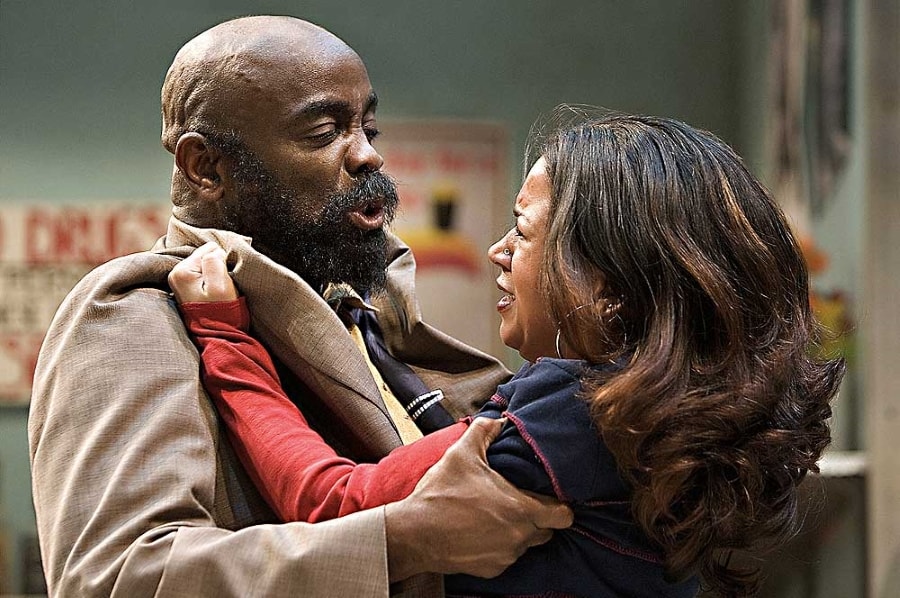
The force of nature that is Kwei-Armah grew up in London’s Southall neighborhood, as the child of parents who had immigrated from Grenada in the 1960s. He studied classical African civilization through the Open University, and obtained a master’s in screenwriting from the London College of Communication. He worked as a stage and film actor, released a pop album, and snagged a role in the British TV series “Casualty.”
Along the way, he began writing plays with themes that included the racial and ethnic tensions in modern Britain. His first play, A Bitter Herb (1998), premiered at the Bristol Old Vic and won the Peggy Ramsay Award. But his breakout work was the 2003 play Elmina’s Kitchen, about the effects of neighborhood crime and violence on a family operating a West Indian restaurant in London: Initially produced at the National Theatre’s Cottesloe venue, the play was nominated for an Olivier Award and transferred to the West End. In addition to penning other plays (Statement of Regret, 2007; Let There Be Love, 2008; and so on), Kwei-Armah wrote the 2008 film Walter’s War, produced by BBC Four, about a black British officer in World War I.
In 2005, Center Stage mounted the U.S. premiere of Elmina’s Kitchen, and Kwei-Armah flew over for the occasion. The visit was the beginning of a warm relationship between the playwright and company. Two years later, Center Stage entrusted Kwei-Armah with his first directing job, a staging of Naomi Wallace’s Things of Dry Hours.
When artistic director Irene Lewis left, after two decades as the company’s head, Kwei-Armah agreed to take the position. He moved to Baltimore with his wife and the youngest of his four children (the older ones are in school and college in England). Also arriving with Kwei-Armah, apparently: a blast of dynamism.
“What audiences seem to be registering is that there is this extra vivacity and energy to the building,” says Gavin Witt, the company’s associate artistic director and director of dramaturgy.
“He has an overabundance of joy that is infectious,” declares Kevin Kilner, who performed in the company’s 2012 production of An Enemy of the People under Kwei-Armah’s direction. A screen and theatre veteran (he was in the original Off-Broadway Dinner with Friends cast) who would have earned the right to be jaded by now, Kilner was bowled over by Kwei-Armah’s ebullience, supportiveness and habit of welcoming ideas and questions. “It was as spiritual a process as I’ve ever had in the theatre,” Kilner says.
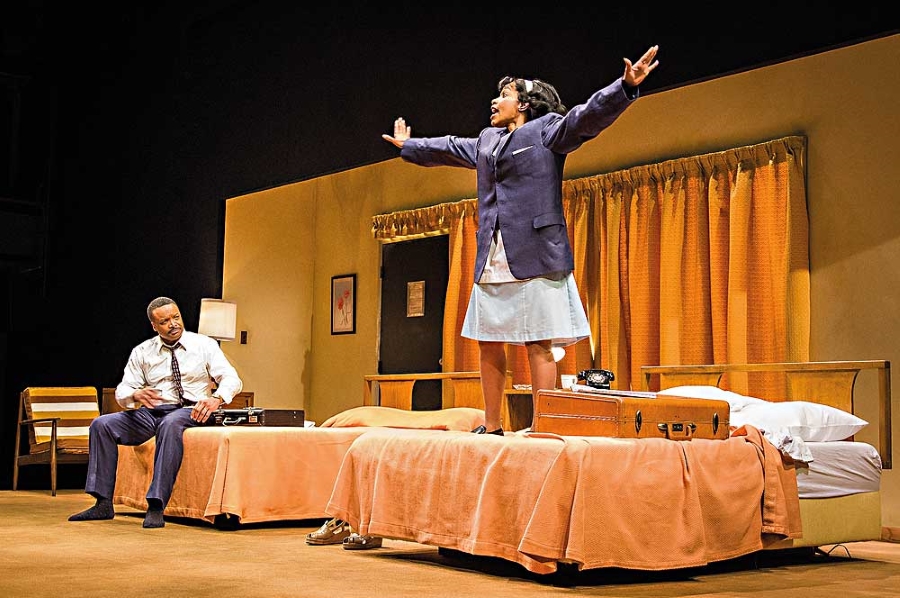
With Kwei-Armah at the helm, Center Stage has been intensifying its focus on new writing, notes Witt, citing as an example the recently established Hot Desk residency program for emerging playwrights. The theatre’s 2013–14 season will include, among other offerings, Marcus Gardley’s dance of the holy ghosts: a play on memory and Colman Domingo’s Wild with Happy, as well as The Liquid Plain.
Additionally, says Witt, who has been with the company since 2003, Center Stage has “turned up the volume on our commitment to local artists—embracing local actors, directors and designers more, with more of a commitment to ensuring that they’re working here and that we are a theatre of, and for, the community.” It’s not that dedication to community was lacking before Kwei-Armah’s tenure, Witt emphasizes, but “it was quiet. It wasn’t our first order of business. I would say he has moved it up to a first order of business.”
“The perception of the institution when I came in was that it was a bit of a castle on a hill,” Kwei-Armah says on this subject. “That you couldn’t get an acting job here if you didn’t have a New York postcode—I knew when I came in that I wanted to smash that.”
If he has tinkered with Center Stage’s institutional mandate, Kwei-Armah has also maintained his own artistic identity. He has directed at Center Stage and elsewhere, and has written Beneatha’s Place, a play that is both a riff on A Raisin in the Sun and a response to Bruce Norris’s much-staged Clybourne Park (itself a gloss on Raisin). At the end of the 2012–13 season, Center Stage mounted The Raisin Cycle—repertory productions of Beneatha’s Place and Clybourne Park, directed by Derrick Sanders. (A documentary about The Raisin Cycle will air nationally on PBS on Oct. 25, 2013.)
In two interviews in his Center Stage office during the lead-up to the Beneatha’s Place premiere, Kwei-Armah spoke about his vision for the play, his creative and intellectual roots and his connection to Center Stage. The following is an edited version of the conversations.
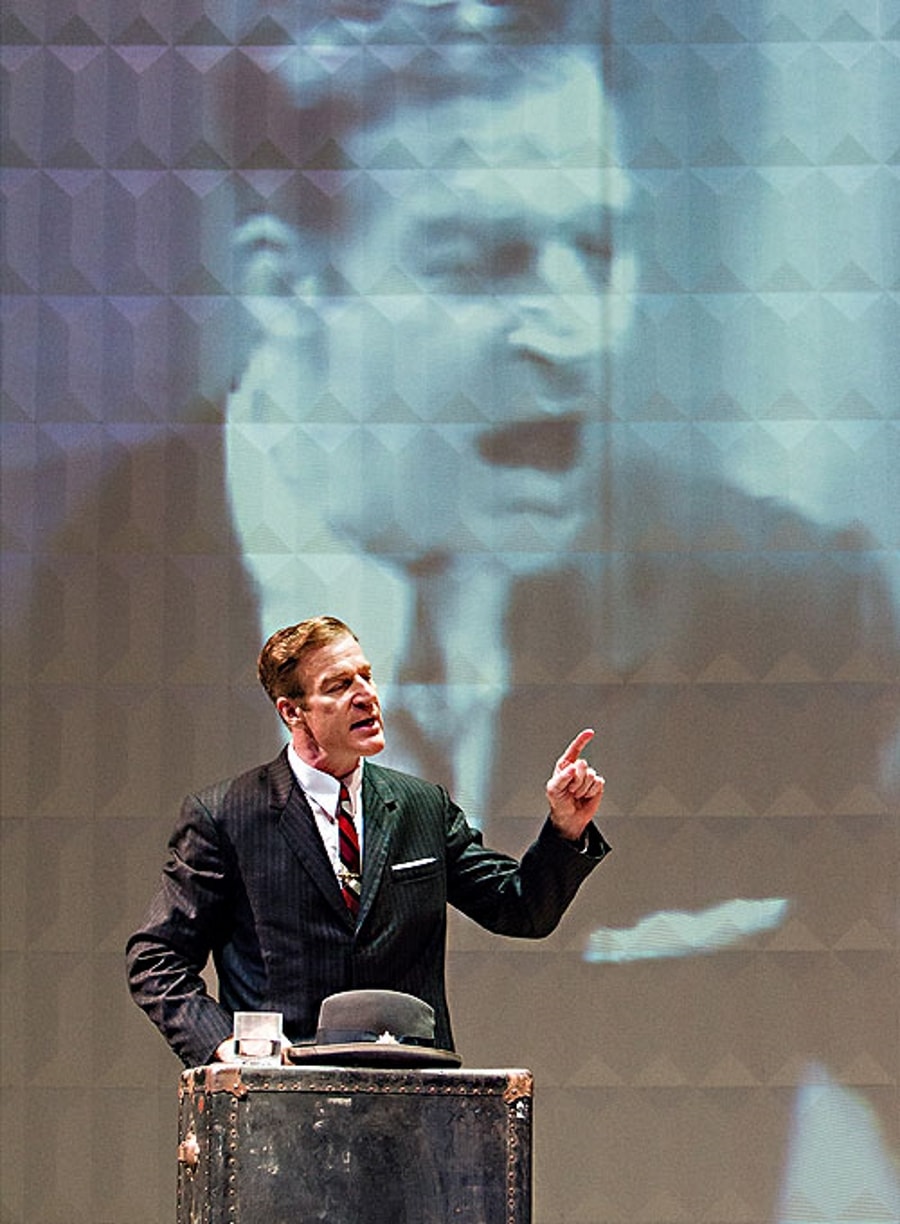
CELIA WREN: Your first contact with Center Stage was when the company did Elmina’s Kitchen, and you came to see it.
KWAME KWEI-ARMAH: And that’s why I’m here. I had the greatest time. I began to call this my second artistic home after the National [Theatre in London]. We had magnificent times going into prisons and board rooms and schools, and we had community discussions around the themes of the play. As a writer, my job is to be a catalyst for debate—and the debate was fast and furious and deep. I fell in love with the theatre, and its audience and the people that work here—and its ethos.
You’ve written and acted for film and TV. Why focus on theatre?
I often describe theatre as one of the few art forms where you can see the spit and smell the funk. I can look at myself in human form. I can listen to myself, not just symphonically and sonically, but in 3-D. And there’s something about hearing an audience laugh at something humorous that you’ve written. There’s something about getting to the end of a play and seeing some audience members unable to applaud because they’ve been moved. There’s something about the magic of theatre that, if I could explain, I’d be a very rich man, because I’d be able to explain the science of being moved, and the science of inspiration, and the science of feeling at home. No one in my family before me was in theatre. But I walk into a theatre anywhere in the world, and I feel at home.
Up until I took this job, I trucked around—I did theatre, then TV acting, then radio, then a bit of presenting for documentary. So it’s only been [since 2011] that theatre has been the centerpiece. And even here: I just finished doing a radio documentary this weekend, and I’ve read a couple of radio plays since I’ve been here. So I’m mixing media.
When did you first know you wanted to be in theatre?
The two are separate moments. I was 20 years old and I saw an actor called Hugh Quarshie in The Admirable Crichton at the Royal Exchange Theatre in Manchester. Hugh is black, and it was one of the first times I’d seen integrated casting. He was playing a lead in a play that would traditionally have been played by a white actor. It was simply magnificent. The artistic director of the theatre later told me that he sat across from me—it was in-the-round—and could see my eyes widen as the performance became greater and greater. That’s the moment when I went, “Look: This is something that moves people.”
As a playwright, it was when I went to see Joe Turner’s Come and Gone at the Tricycle Theatre in London [a few years later]. It was the first August Wilson that I had seen, and I was struck to my core by how he spoke diasporic truths. I had seen black artists seem to trade absolute cultural truth for access—certainly for success. And August was there speaking absolute truths as we perceive them. Black truths. I realized that one could be true to oneself and have a career in theatre as a writer. That’s when I went, “This is something I feel in my belly and my soul.” But I didn’t start writing for a long time after that.
When I started to write—the freedom! The freedom that I found in writing for theatre was almost second to none that I had experienced in my life.
Have you found that your experience of minority communities in Britain helps you understand the dynamics of minority communities in the U.S.?
Certainly. Most of my education has come through the lens of the African-American community. It’s relatively difficult, I imagine, for Americans to grasp the true power of the export that one calls American culture. Particularly in the black world—we grow up almost worshipping the African American. They are the top of the Pan-African tree. That mainly has to do with access. We had access to see them on the television. We had access to their music when we didn’t have access to the airwaves in Britain. In many ways the Harlem Renaissance is at the root of nearly everybody’s understanding of the height of black creativity. So, yes, I would say having an understanding of black British culture certainly aided me in having perceptions on African-American life.
And you also learned from African Americans and applied that to what went on in Britain?
Absolutely. When the Black Panther party started in America—before you knew it, there was one starting in Trinidad, and then one in Britain. When our riots happened in the ’80s in Britain, we looked at the pattern of riots in America in the ’60s and early ’70s. When we looked at music, we looked at African Americans, and the movement from Motown to the Philadelphia sound, and asked, “How does that work in a black British context?” Intellectually, with the works of Henry Louis Gates, Malcolm X and Stokely Carmichael—one bathed in the leadership the African-American community has always played in the black world.
Did you start reading African-American intellectuals and writers on your own, or was it in school?
There was a community of thinkers from an older generation that said, “If you wish to discover yourself, read this.” I was introduced to the narrative of Roots when I was 11, and it laid fundamental seeds about culture and cultural reclamation. I was introduced to The Autobiography of Malcolm X at 19, and it profoundly turned my life around.
One cannot overestimate how much of our history was kept from us, as people of color. From the ’80s to now, the voyage of self-discovery—we have gone to the center of the Earth and back! Britain now is a country that understands diversity. It has moved forward, without question. But Britain back then was very cold and prejudiced.
I described myself to my cousin as a universal alien. I said, “In Britain, they say, ‘Go back where you come from!’; when I go to the Caribbean they say, ‘Go home, Englishman!’ When I go to Africa, they go, ‘Hey, Bob Marley!’” I said, “I don’t fit anywhere!” And my cousin said, “Here’s your history.” He showed me The Autobiography of Malcolm X. Being shocked by the similarities between Malcolm’s life in the 1950s and mine in 1980s Britain—it was life-changing!
You were the artistic director of the World Festival of Black Arts and Culture in Senegal in 2010.
It is probably the greatest venture that I have been associated with. In truth, had I just been asked to represent Great Britain, I could have put that on my tombstone! But I was asked to be the artistic director; to direct the opening ceremony—which was in a stadium, in front of many of the presidents of Africa—and to get major artists from across the world to come and display their art. Our theme was, “Who is Africa? What will Africa be at the end of the 21st century?”
Before that, the largest thing I had directed was nine actors on the Tricycle stage! Now here I was with a cast of 1,000, with 60,000 people watching. And, more important, I was part of something that I had believed in all of my life. I don’t know what there is in life that will top that for me.
It must have been a big decision to leave England.
Like all decisions, it looks bigger in retrospect. I’d been asked to run institutions in Britain, and I’d always said no, because it was never on my checklist to be an artistic director. But it just so happened that, when this job came [at Center Stage], I had been offered the World Arts Festival, and that was something I couldn’t turn down.
I hate complaining. England, for all of its marvelousness, can sometimes be a culture of complaint—it might have something to do with the weather. I found myself complaining a lot, in London, in particular, about what plays were being staged, and why, why, why? And when the Center Stage job went on the market, I was a bit like, “Rather than complain about what artistic directors do, throw your hat in the ring! And if you don’t get the gig, at least you tried to do, rather than just complain.”
And you weren’t worried about sabotaging your playwriting career by being swept up in administrative issues?
Yeah, I was, of course. Still am. But I’ve been here 20 months, and I’ve written two radio plays and two plays, and a screenplay. So I have been able to continue to write. At what cost? The cost of sleep.
I managed to do most of that [writing] in my first 12 months. The last six months or so has been very hard. I feel a play in my belly, and then I get slightly irritable, because I want to start it. And the last six months have been quite intense, because I’ve been opening four world premieres. [The Liquid Plain; Dominique Morisseau’s Detroit ’67, which he directed in New York this past spring; Beneatha’s Place; and Marisa Wegrzyn’s Mud Blue Sky, whose premiere he oversaw at Center Stage this past season.] That’s been brilliant. Working with playwrights and new plays is part of the superbuzz.
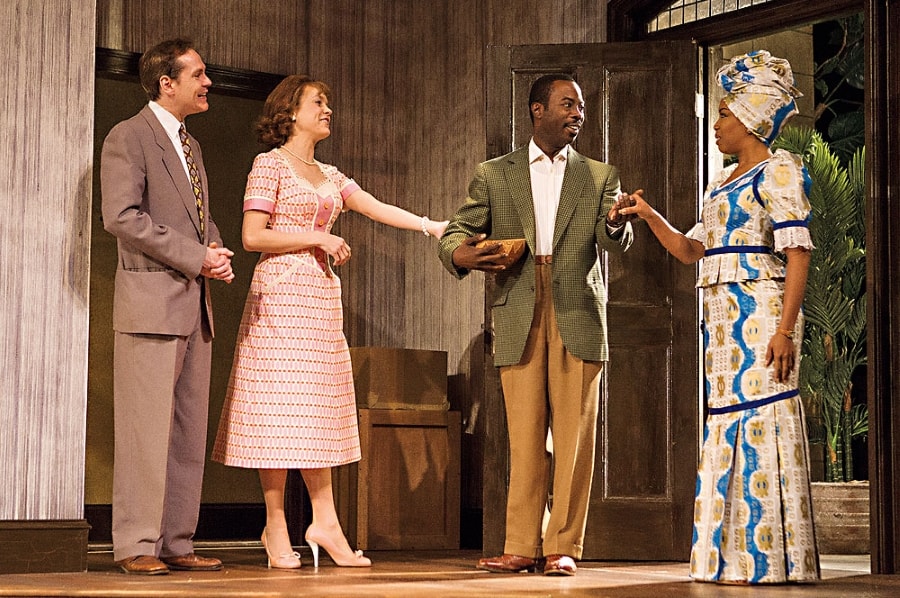
Jessica Frances Dukes in Kwei-Armah’s “Beneatha’s Place” at Center Stage. (Photo by Richard Anderson)
When we were at the rehearsal of Beneatha’s Place, you were talking to the cast about neo-colonialism, and what happened in Nigeria in the 1950s, and issues of global relations. Do you find that you approach plays from an intellectual standpoint?
This is something that I think about often: Do I over-intellectualize something that becomes difficult to play emotionally? I am, quote-unquote, a political playwright. That is how I perceive myself. Which invariably means that it begins in my head, and I have to bury that in the body of the piece, so it doesn’t become agitprop. I worry about being too emotional, or not emotional enough. And I love to write in subtext, so how opaque am I being? That’s a very long way round of saying that my way of writing is just to write, and then put it through the sieve of structure, and then shake it out and put it in the mouths of actors and see its flaws. Rehearsal for me is a deep part of the writing process.
Tell me why you wrote Beneatha’s Place.
I saw Clybourne Park in London and L.A., and both times I found it to be everything that good playwriting should be: It is a wonderful catalyst for a debate. It captures the zeitgeist. And it’s brilliantly written and funny. It has a Tony, a Pulitzer and an Olivier to prove it.
I don’t think Bruce [Norris] went out to write anything that was at all offensive. But the connotation attached to the arc of the narrative, in my humble opinion, is that white communities build, and black communities destroy. We’re all aware of gentrification, and that’s what I think Bruce was talking about. But there was a connotation that I was interested in having a debate with. Many artistic directors are doing Raisin and Clybourne as a double-header; as an artistic director who’s a writer, I thought we could do the play in rep with something new—something added to the conversation.
I went to three or four other playwrights first. They said it was my job to do it: If I felt this in my belly, then it was up to me to do it, and I shouldn’t be copping out. So after that, I went, “Okay, cool.”
It was a real suicide mission! But you know, as a playwright who believes fundamentally in the right of the playwright to be a catalyst for debate, I felt that, if I was going to put Clybourne Park on, in an area that is 65 percent African American, that I should pair it with something that maybe speaks to the connotation that I found in Bruce’s play. And when I looked at Raisin, a play that I grew up with, I found myself drawn to [the character of] Beneatha. She’s Afrocentric; she’s into the big ideas of her times. I wanted to take Beneatha and explore what happens next.
I keep saying this, and I sincerely mean it: Mine is not a challenge to Bruce; neither is it a fight with Bruce. It is a conversation.
How did working in British theatre prepare you for work here?
I was an associate at the National. Nick Hytner [director of the National Theatre] and Nick Starr, who is the executive director there—both men are geniuses. I would sit at the foot of their table and just listen. So I felt that had given me a good grounding. Nothing grounds you to be an artistic director, though. There’s no school. There is the fire of it. And, unlike the World Arts Festival, this is a marathon and not a sprint.
Any long-term plans for Center Stage you want to mention?
[Laughs, and indicates several quotations affixed to the wall.] No. You can see on my wall, “Don’t forget the original big ideas that you came in with.” I juxtapose that with “How to make it viable, not just cool,” which came from Terry Nolen, the producing artistic director of the Arden Theatre Company in Philadelphia. He just said it in a conversation, and I scribbled it down. As I think about where Center Stage moves in the next few years, it’s balancing those two things.
Critic and arts reporter Celia Wren is a former managing editor of this magazine.

